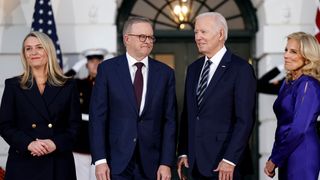Concerns about the humanitarian crisis and potential for an expanding regional conflict in the Middle East, the fate of the Ukrainian counteroffensive and dysfunction in the US House threaten to overshadow opportunities for the Australia-US alliance to grow in scope and ambition during Albanese’s visit this week.
With so many delicate issues reaching fever pitch at once, it may appear a misjudgement for Albanese and Biden to devote so much attention and ceremony to their bilateral relationship. But, as the White House contended this week, demonstrating the resolve and strength of US alliances in these times of crisis is not only important, but essential.
With Russia’s invasion of Ukraine dominating US foreign policy efforts in 2022, USSC polling from September that year showed a record-high 63 per cent of Americans thought their country’s transatlantic alliance with NATO made them more secure. This effect wasn’t just isolated to European allies, with the security benefits of the other US alliances with Australia (58 per cent), and Japan (49 per cent) also soaring to record highs in American public opinion.
Americans were not alone in this trend last year. Sixty-three per cent of Australians in 2022 said their alliance with the United States makes their country more secure, and when faced with a hypothetical question about the security benefits of an alliance with Japan, a strong majority (59 per cent) of Australians said an alliance would make them more secure.
Where do Americans and Australians stand on their alliances this year? On 1 November, the USSC will release its findings from its report One year from the 2024 presidential election: The stakes for Australia and the alliance, featuring unique findings from the Centre’s polling of Australian, Japanese and American publics.
To be first in line to hear the authors’ analysis of the findings, register to attend the USSC’s inaugural Sydney International Strategy Forum below, and for media enquiries email Victoria at ussc.media@sydney.edu.au
This article was first published in the weekly 46th newsletter. Subscribe to the 46th here.






